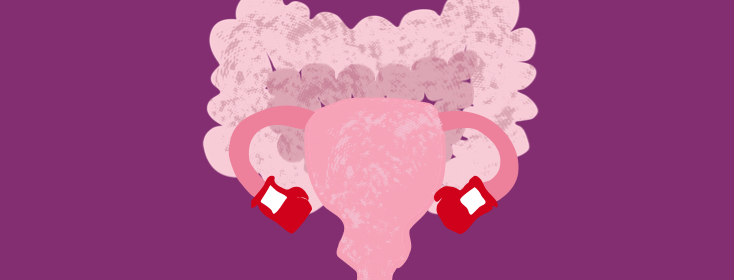When IBS and Endometriosis Intersect
I remember it very clearly: a night I was driving home from the diner with my new boyfriend and feeling the distinct rumbling in my belly that signaled I would need a bathroom soon. I barely said good-bye to him before rushed upstairs to my dorm room and hardly had time to drop off my things and make it to the toilet on the communal bathroom on my floor. Luckily, no one was in there, but I still felt embarrassed. When I came back to the room I woke up my roommate and asked her if she had any Imodium. She did and I took it and went to sleep, thinking it was an isolated incident. Everyone gets diarrhea once in awhile, right? Little did I know this was the beginning of something that would ruin my life for many months and even lead to years of complications.
Afraid to eat
I was a junior in college at this time and a new transfer to the school. I had just moved there a few weeks before when my intestines revolted. What started as something that was a few times a week, then devolved to a few times a day, and then finally to as much as a dozen times a day. It got to the point where I was afraid to eat anything or ever be more than a few feet from a bathroom. I began to isolate myself and refused to go on outings with my then-boyfriend. I began to lose weight – so much weight that the school nutritionist took notice and began coaching me on healthy eating habits. She thought I had an eating disorder. But I did not. I was sick.
In fact, I was always hungry and wanting to eat. But it just seemed everything I ate went right through me, no matter what it was. By the end of the semester I had lost over 25 pounds – bringing me to 100 pounds altogether on my 5'4 frame. My face was pale and gaunt and my pants all slipped off of me even after making new holes in my belt. I took a medical leave of absence the following semester and returned home to Brooklyn to recover and see what was happening to my body. My first visit to a nationally-renowned gastroenterologist in Manhattan offered me some hope, even if potentially bleak news. He was convinced I had Crohn's disease. But the colonoscopy revealed nothing and I was instead slapped with an IBS diagnosis. I was treated harshly – as though I were faking the sickness or just not eating well. It was "just IBS" he told me. But I knew my symptoms were real and I was very sick. It being "just IBS" did not minimize the fact that it was seriously disrupting my life: I had dropped out of school, I had lost my boyfriend and even some friends and I couldn't even work at the time.
Link between endometriosis and IBS
It seemed it was up to me to do my own investigative research to see what was wrong and how I could get better. I had been suspicious for some time I had endometriosis due to the excruciating periods I endured every month since I was 12 (I got my first period at 9). I always noticed I experienced GI issues during these days even before I had full-blown IBS. While I know GI issues during menstruation is not uncommon in women without endometriosis either, I began to suspect a link between my IBS and endometriosis.
Unfortunately, I would not have my fears confirmed till several years later in my early 20s when I finally had health insurance willing to pay for laparoscopic surgery to diagnose and remove the endometriosis (diagnosis can only be confirmed by surgery). In particular, the surgeon found that large strands of the endometrium (the lining of the uterus that women shed during menstruation, but in those with the disease it grows elsewhere) strangling my large intestines and adhering my ovaries and Fallopian tubes to my colon. I finally felt validated and relieved to ultimately know that I had a physical issue causing my bowel problems. Even though I don't think endometriosis was the only thing culpable for my IBS – food sensitivities and intolerances and gut flora seemed to play a role, too – the endo undeniably compounded and complicated my IBS. Within about five months of my surgery, I noticed a significant improvement in my IBS, that was further aided by me paying closer attention to my diet and taking a high quality probiotic on a daily basis.
While I still suffer from IBS, my episodes are not as severe or frequent by far as they were in my college and pre-laparoscopy days. I am a healthy weight and know to eat a very specific diet during my period to minimize GI issues. I tentatively plan to have a second laparoscopy within the year and am also considering a hysterectomy (removal of the uterus only, not the ovaries or cervix) – which might also help ease some GI issues further if there is more endometrial growth on my intestines.
If you are someone who suffers from both IBS or IBS-like issues and have ruled out more serious diagnoses like Celiac, Crohn's or Ulcerative Colitis, and also suffer from debilitating and painful periods, you might consider that endometriosis could be a primary or partial culprit in your GI issues. I know it was for me, and getting my endo addressed was crucial to managing and finally having some control over my IBS.

Join the conversation